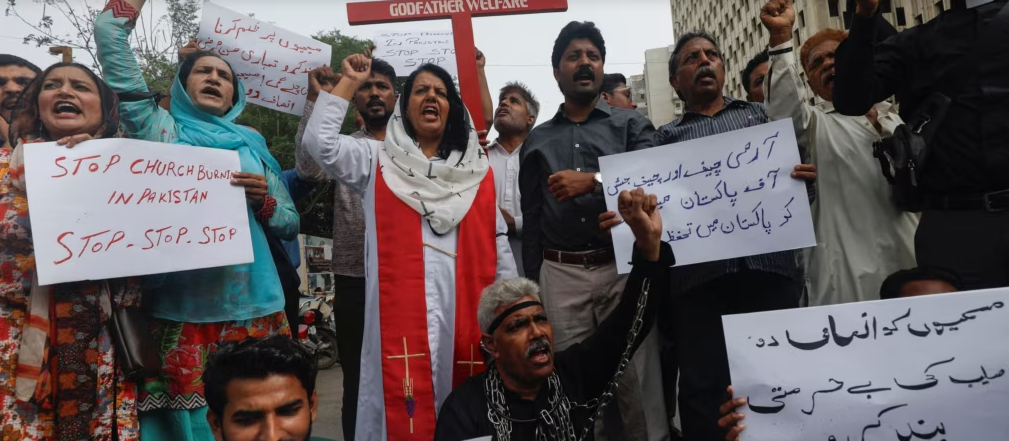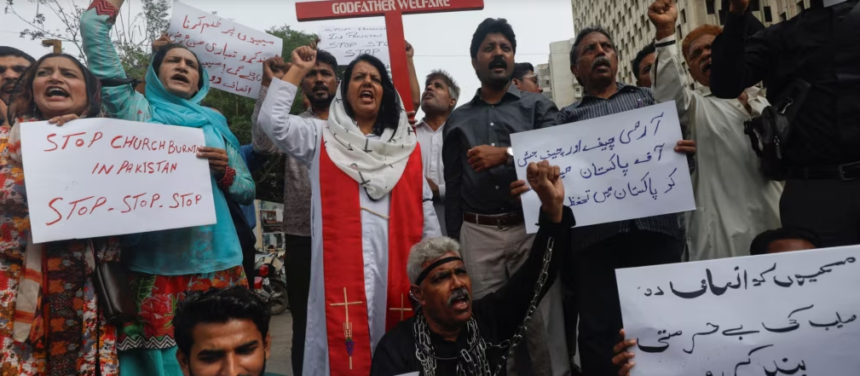The Death of Pakistani Christian Accused of Blasphemy: akistani Christian In the predawn quiet of a small Pakistani town, an ominous silence was shattered by an incident that underscores the perilous intersection of faith, law, and violence in Pakistan. A Christian man, falsely accused of blasphemy, succumbed to his injuries after being attacked by an enraged mob. This tragic event is not just a momentary flashpoint but a reflection of deeper, systemic issues plaguing the country.
The Death of Pakistani Christian Accused of Blasphemy:
The Pakistani Christian victim, whose identity has been withheld for his family’s safety, was a member of the minority Christian community in Pakistan. He was accused of blasphemy, a charge that in Pakistan carries severe repercussions, often leading to vigilante justice before the legal system can intervene. On that fateful day, a rumor spread rapidly through the town, igniting a firestorm of anger and resentment. Without any credible evidence, a mob descended upon the man’s home.
Eyewitnesses recount a scene of chaos and brutality. The mob, armed with sticks, stones, and a fervor fueled by perceived religious duty, attacked mercilessly. His pleas for mercy were drowned out by the collective rage of his assailants. The local authorities, often hesitant to intervene in cases of alleged blasphemy due to fear of backlash, were conspicuously absent during the initial assault.
The Aftermath
By the time the police arrived, the damage was irreversible. The man was left severely injured, barely clinging to life. He was rushed to a nearby hospital, but the extent of his injuries proved fatal. His death sent shockwaves through the community, both locally and internationally, highlighting the precarious situation for religious minorities in Pakistan.
The Pakistani Christian a community, already living in a state of constant vigilance, was thrust into a period of mourning and fear. For them, this incident was not an isolated case but a grim reminder of their vulnerability. The fear of baseless accusations and the subsequent violence looms large over their daily lives.
Historical Context
Blasphemy laws in Pakistan have a long and contentious history. Introduced during the colonial era and later fortified under the regime of General Zia-ul-Haq in the 1980s, these laws were intended to protect religious sentiments. However, over time, they have been increasingly misused to settle personal scores, target minorities, and incite mob violence.
For religious minorities, particularly Christians and Ahmadis, these laws have become a sword of Damocles. False accusations are alarmingly common, often resulting in immediate and violent reactions. The legal system, instead of acting as a bulwark against such injustices, frequently exacerbates the situation through prolonged detentions and unfair trials.
Societal Dynamics
The societal fabric of Pakistan is complex, woven with threads of deep-seated religious beliefs, economic disparities, and political dynamics. In this intricate tapestry, religious minorities often find themselves marginalized. The education system, media portrayals, and even political rhetoric have contributed to a pervasive environment of intolerance and discrimination.
Educational curricula, for instance, have been criticized for promoting a singular religious narrative, often at the Pakistani ChristN expense of minorities. This has led to a generation of individuals who may harbor biases against non-Muslim communities. Media, too, plays a significant role in shaping public perceptions. Sensationalist reporting and lack of responsible journalism often exacerbate communal tensions.
Politically, the issue of blasphemy is a potent tool. Politicians, wary of losing support from religious hardliners, rarely speak out against the misuse of blasphemy laws. This silence is deafening and speaks volumes about the state of political will to address this critical issue. 
for more information click on this link
The legal proceedings in blasphemy cases are notoriously protracted and fraught with irregularities. Accused individuals often spend years in jail awaiting trial, during which they face severe mistreatment and abuse. Legal representation is hard to come by, as lawyers willing to defend the accused often face threats and violence themselves.
Pakistani ChristN The judiciary, too, operates under immense pressure. Judges handling blasphemy cases are acutely aware of the potential repercussions of their decisions, which can include threats to their own lives. This environment of fear and intimidation undermines the very foundation of justice.
International Response
Pakistani ChristN The international community has repeatedly expressed concern over Pakistan’s blasphemy laws and their misuse. Human rights organizations, including Amnesty International and Human Rights Watch, have documented numerous cases of abuse and called for urgent reforms. Despite these calls, tangible changes have been minimal.
Western governments, while expressing diplomatic concern, often tread cautiously due to geopolitical considerations. Pakistan’s strategic significance in regional politics means that human rights issues sometimes take a backseat in international dialogues.
Voices of Change
Amidst this bleak landscape, there are voices advocating for change.Pakistani ChristN Civil society organizations, human rights activists, and some progressive political leaders continue to push for reform. Their efforts, though met with resistance, represent a glimmer of hope.
Pakistani Christian Grassroots initiatives aimed at promoting interfaith dialogue and understanding are gradually making inroads. These efforts, though limited in scope, are crucial in fostering a culture of tolerance and coexistence.
The Path Forward
The path to resolving the issue of blasphemy-related violence in Pakistan is fraught with challenges. It requires a multifaceted approach that addresses legal, societal, and educational reforms.
- Legal Reforms: The Pakistani Christian blasphemy laws need to be revisited and reformed to prevent misuse. This includes implementing safeguards against false accusations and ensuring fair and timely trials for the accused. Additionally, protection mechanisms for judges, lawyers, and witnesses involved in blasphemy cases must be strengthened.
- Educational Reforms: The educational curriculum should be revised to promote inclusivity and respect for all religious beliefs. This involves eliminating biased content and incorporating teachings on human rights and coexistence.
- Media Responsibility: Media outlets should adopt responsible reporting practices, especially in cases involving blasphemy accusations. Sensationalism and bias must be curbed to prevent inciting violence and prejudice.
- Political Will :Pakistani Christian Political leaders must muster the courage to speak out against the misuse of blasphemy laws. This requires a concerted effort to balance religious sensitivities with the principles of justice and human rights.
- International Pressure: Th e Pakistani Christian international community should continue to exert pressure on Pakistan to uphold human rights and implement necessary reforms. This includes leveraging diplomatic channels and international platforms to advocate for change.
- Community Engagement: Grassroots initiatives that promote interfaith dialogue and understanding should be supported and expanded.V Building bridges between different religious communities is essential for fostering a culture of tolerance.
Conclusion
The tragic death of a pakistani Christian man falsely accused of blasphemy in Pakistani ChristN is a stark reminder of the urgent need for reform. It highlights the vulnerabilities faced by religious minorities and the dangerous consequences of unchecked mob violence. As Pakistan grapples with this issue, it must navigate a delicate balance between religious sentiments and the principles of justice and human rights.
The Pakistani ChristN road to change is long and arduous, but it is a journey that must be undertaken. For the sake of its citizens and its place in the global community, Pakistan must confront these challenges head-on and work towards a future where justice prevails, and no one lives in fear of violence for their beliefs. The death of this man, though tragic, should serve as a catalyst for meaningful change, ensuring that such atrocities are never repeated. ALSO READ:- First Woman Claudia Sheinbaum Makes History as Mexico’s President 2024





